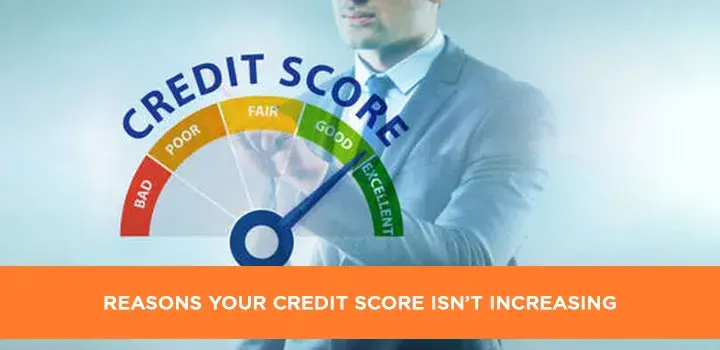
Your financial value is calculated by your credit score; so, it might be aggravating if your score is low and not improving. Fortunately, there may have been at least one rational cause for this event - like large balances or limited history- so learn more about why yours has frozen in place and what we advise doing about these freezes!
Top Reasons Your Credit Score Isn’t Increasing
1. You've Missed Some Payments
A missed payment might be expensive. Not only will you incur a late charge, but your credit score can suffer too. This can make it challenging to get authorized for a loan or even rent an apartment. You should so act immediately if you have missed certain payments.
2. Your Debt Balances Are High
Your debt amounts are not unique if they are high. The typical American home has a credit card debt of more than $15,000. Although paying off such a big debt might feel overwhelming, there are actions you can do to help you handle the process. Starting a budget and implementing some basic ideas can help you start to manage your debt. So avoid hopelessness; aid is just waiting for you!
3. You Have a Limited Credit History
Having never had a credit card, auto loan, or personal loan will restrict your credit history. Or, if you have, but your oldest account is less than three years old. Getting authorized for new credit products might prove difficult this way. Here's how you could raise your chances of approval even with a little credit history.
4. You've Submitted Too Many Credit Applications
Applying for loans results in lenders looking at your credit record, of course. Too many applications in a short period might cause lenders to be wary and can lead to their decision not to grant loans. Thus, take into account the number of credit applications you have applied in the last 12 months before you send that one. Should it be more than one or two, let yourself sometime before reapplying. In this sense, you will prevent any bad effects by increase your credit score and raising your chances of obtaining the credit required.
5. You Only Have One Type of Credit Account
You have one kind of credit account exclusively. Exactly, just one. So rethink if you're considering broadening your credit portfolio. Indeed, having many kinds of credit accounts might lower your credit score. Lenders may consider you a higher-risk borrower if they see many kinds of credit accounts on your record. They could believe you're overextended or that you're hiding something. Thus, be sure your current accounts are in good standing before you obtain yet another line of credit. Otherwise, your credit score might be suffering more damage than benefit.
6. A Creditor Has Incorrectly Reported Account Information
Should you be a creditor, be advised that sending erroneous information about an account to a credit reporting agency might result in liability. The Fair Credit Reporting Work (FCRA) expressly mandates that creditors work reasonably to guarantee the accuracy of the data they provide. Therefore, should you be discovered to have provided erroneous information, you might suffer some severe penalties.
Get Help Improving Your Credit Score with Credit Repair Ease
Among the most crucial figures in your financial life is your credit score. While a poor credit score might make it challenging to borrow money at all, a good credit score can help you receive the best interest rates on credit cards and loans. Should your credit score be poor, you may be asking how you can raise it. Working with you to eliminate bad entries from your report and enhance your payment history can help you raise your credit score with credit repair simplicity.
Call (888) 803-7889 today to learn more about our services and how we can help you raise your credit score!